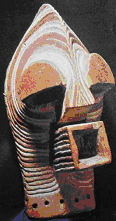< a shaman of Orochon in Northeast Asia >
We watch sickness and medicine of the preliterate society several times from now on.
From their simple life, the consciousness of the sickness which not to be affected by the civilization is seen.
This is helpful for understanding the medicine of ancient civilization.
The indigenous people of a remote place had been living like refusing civilization.
Many of them escaped the conqueror, or wanted the new world, and stayed at the remote place.
They did not necessarily preserve the primordial society that traced back to 10,000 years before.
これから数回、無文字社会の病と医術を見ます。
彼らの素朴な暮らしから、文明の影響を受けない病に対する素朴な意識が見られます。
これは古代文明の医術を理解するのに役に立ちます。
僻地の先住民は文明を拒絶するように暮らして来ました。
彼らの多くは征服者から逃れ、または新天地を求めて、その地に閉じ籠もった。
彼らは必ずしも1万年を遡る原初の社会を保存しているわけではありません。
< Nomad of the south Sudan >
The sickness
How are the indigenous people in the world looking at the sickness?
Many people distinguished the ordinary sickness (cold, fatigue) and the sickness which an evil spirit caused, and requested a medicine man in the latter case.
They thought that spirits and devils, magic and black art caused the sickness.
When anybody was cursed, the people believed that it caused the sickness and death, even if it was a great distance, or when a foreign matter (animal) invaded the body too.
There are good and evil spirits, and if they offend a spirit, it will become an evil spirit.
The dead became the spirit and loitered around, and people feared to be possessed by an evil spirit.
病
世界中の先住民は病をどのように見ているのだろうか?
多くは、普通の病(風邪、疲労)と霊等が引き起こす病を区別し、後者を呪医に依頼する。
病は、霊や悪魔、魔術や呪術により起こると考えられていた。
呪いがかけられると、遠く離れていても病や死に至り、または異物(動物)が体内に侵入しも起こると人々は信じた。
霊には善悪があり、喜ばすと善霊に、怒らせると悪霊になる。
死者が霊になってうろつき、人々は霊に取り憑かれたりすることを恐れた。
< American Indian >
The correspondence to a sick person changed by various ethnic groups.
In the American Indian, he was treated kindly.
Furthermore one who recovered serious sickness was revered as the owner of unusual power.
By an ethnic group, a disability person was murdered, and when the starvation visited their area, a suicide and a desertion were performed.
The madman (mental patient) was thought that an evil spirit clungs to person, and he was kept away, and was maltreated or was murdered.
The psychotic behavior was considered to have shaman's qualification in Eskimos etc.
病人や不具者への対応は民族によって異なった。
北米インディアンでは親切に扱われ、重い病気から回復した者は尋常ならぬ力の持ち主と畏敬された。
ある民族では障害者は殺され、飢餓に瀕した場合は自殺や置き去りがおこなわれた。
狂人(精神病)は悪霊が取り付いたと見られ、遠ざけられ虐待、あるいは殺された。
エスキモーなどでは、精神病的な行動はシャーマンの資格があると見なされた。
< a mask of medicine man in Congo, this mask have a purpose of threatening an evil spirit. >
Medicine man
Medicine man is shaman.
His main role prevented a disaster such as bad crops by a prayer and was to decide a schedule of the village by divination.
It is said that he had the ability that can communicate with spirits.
He be respected in a village, but may be murdered if he fail.
If a tribe is big, the specialty in charge was divided among the accident, and the sickness etc.
One using medicinal herb take part ordinary sickness, and he pray still at using medicinal herb.
Continue to the next time.
呪医は呪術師(シャーマン)である。
彼の主な役割は、祈祷により凶作などの災厄を防ぎ、占いにより村の予定を決めることであった。
彼らは霊と交信可能な能力を持っているとされた。
彼らは部落内で尊敬を受けることになるが、失敗すれば殺されることもある。
大きい部族であれば、災厄や病いに専門が別れ、普通の病には薬草家があたり、それでも投薬時に供儀祈祷が行われた。
次回は治療方法を見ていきます。



























